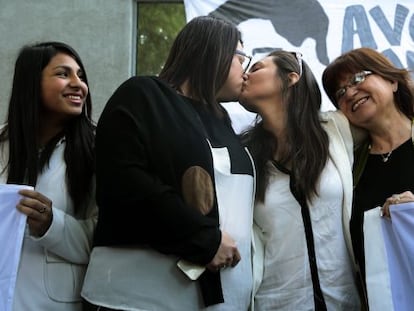The three Brazilian brides who are challenging the traditional family unit
A notary has “married” a trio of women in Río de Janeiro, the second such union to be recognized before the law in Brazil


A businesswoman, a female dentist and a female administrative manager have managed to turn the idea of a traditional Brazilian family on its head, after recently making their relationship official before a notary in Rio de Janeiro.
“We are a family and our union is the product of our love for one another,” said the businesswoman in an interview with the O Globo daily.
We are a family and our union is the product of our love for one another”
“I am going to get pregnant and we are preparing for this, including looking at it in financial terms. This legalization [of the union] is a way to prevent the baby, and us, from being left unprotected by the law,” one of the three brides told the press.
The union marked the second time that a trio has tied the knot under Brazil’s 2003 civil unions law, which has paved the way for legal recognition of same-sex partnerships. In 2012, two females – a cashier and an administrative assistant – decided to formalize their union with a male architect in São Paulo.
The three women, who have lived together for the past three years, signed a document that recognizes them as a family, establishes a prenuptial agreement, and gives them rights to make medical decisions for one another should any of them get sick.
According to the notary filing, they have agreed to allow the businesswoman to become pregnant through artificial insemination. The baby will take their three surnames. The brides also signed three wills that divide up their personal holdings in case of death.
Brazil’s top courts have not ruled on the legality of these types of plural unions, so each case is based on decisions made by local authorities.
The three women based their petition on a 2011 Supreme Court ruling that upheld same-sex unions, said Fernanda de Freitas Leitão, the notary who presided over the “wedding ceremony.”
Such lifestyles have grown popular in larger cities, where social activities, such as group meets and parties, are organized with the help of social media.
In Rio, a regular congress has been held throughout the years – entitled Poliencontro – where polygamy and its effects on society are discussed and events organized for the public. A popular telenovela (soap opera) in Brazil has also featured a polygamous wedding between three women.
Since 2000, Freitas has registered scores of gay partnerships, even before they were officially legalized by the Supreme Court. She said that she had waited for years “with anxiety” so that she could finally register a trio in her notary office.
“The foundation of any family relationship is affection,” she said. “And these three women have everything to form a family – they have love, a strong relationship and they plan on having children.
These three women have everything to form a family – love, a strong relationship and plan on having children”
“I can’t guarantee that they will have immediate rights; they are going to have to fight it out in court if they want to file joint income taxes or take out medical insurance. But at least they are protected,” Freitas added.
There is a strong chance that public controversy will erupt over whether a child can have three mothers at the same time.
Brazil’s Notary Association has distanced itself – as it did with the case of the 2012 wedding – from the decisions taken individually by its members. Yet there are many legal experts who say these types of unions violate the Constitution.
“That register document isn’t worth anything,” said family lawyer Regina Beatriz Tavares, who believes that it will be impossible for the courts to recognize a child can have three mothers.
“The Brazilian Constitution firmly states that a partnership can only be established by two people, and the Supreme Court’s ruling on same-sex unions also refers specifically to two people,” the lawyer said.
The Constitution firmly states that a partnership can only be established by two people”
Tavares, who is also president of the Association of Family Rights and Inheritance (ADFAS), said that polygamy is not protected by the Constitution.
“I am not trying to defend just one type of family, but the principal of forming partnerships has always been restricted to monogamy. Brazilian society does not accept three people getting married, regardless of their sex,” she said.
The recent marriage of these women has shaken conservative lawmakers in Congress, who are desperately trying to restrict public policies to only traditional marriages – that is between a man and a woman.
But a bill, which appears will be approved shortly in the Senate, seems to contradict Brazilian society’s choices.
“When I began to officiate gay partnership unions, the same thing happened – they accused me of doing something illegal,” recalled Freitas.
A popular Brazilian ‘telenovela’ has also featured a polygamous wedding between three women
“All partnerships that go against tradition end up on the same road. First, you have this big rejection from different sectors, then the courts start to recognize their family rights, and everything goes back to normal.
“Even since 2012, there have been cases of children having three parents. For example, those who were born through artificial insemination. History is just repeating itself,” said the notary.
According to the last figures compiled in 2013 by the Brazilian Geographic and Statistics Institute (IBEG), new types of families (single mothers, fathers raising their children alone, childless couples and same-sex partnerships) account for 56.1% of Brazilian households.
In 1980, 75% of households were made up by couples with children. That figure dropped to 43.9% in 2013, according to the IBEG. Polygamy is not accounted for in the statistics.
English version by Martin Delfín.
Tu suscripción se está usando en otro dispositivo
¿Quieres añadir otro usuario a tu suscripción?
Si continúas leyendo en este dispositivo, no se podrá leer en el otro.
FlechaTu suscripción se está usando en otro dispositivo y solo puedes acceder a EL PAÍS desde un dispositivo a la vez.
Si quieres compartir tu cuenta, cambia tu suscripción a la modalidad Premium, así podrás añadir otro usuario. Cada uno accederá con su propia cuenta de email, lo que os permitirá personalizar vuestra experiencia en EL PAÍS.
¿Tienes una suscripción de empresa? Accede aquí para contratar más cuentas.
En el caso de no saber quién está usando tu cuenta, te recomendamos cambiar tu contraseña aquí.
Si decides continuar compartiendo tu cuenta, este mensaje se mostrará en tu dispositivo y en el de la otra persona que está usando tu cuenta de forma indefinida, afectando a tu experiencia de lectura. Puedes consultar aquí los términos y condiciones de la suscripción digital.
